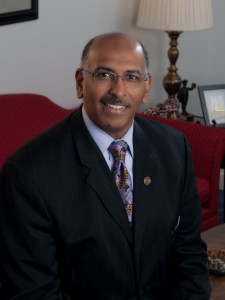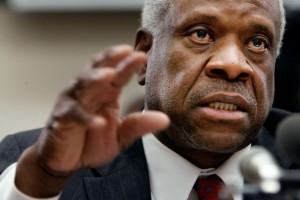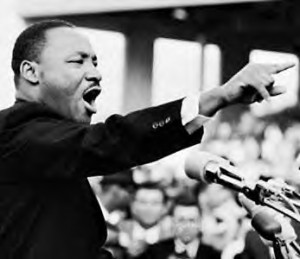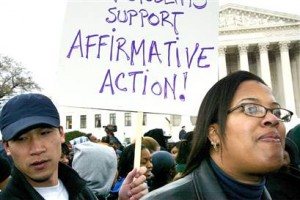 Over the years, I have had the privilege of being “in the room” with quite a number of amazing people. From presidents to philanthropists to ordinary folk who did extraordinary things, each has left an indelible mark on America’s history. But more important than how history views these individuals is the immeasurable contributions that many have brought to the black experience in America.
Over the years, I have had the privilege of being “in the room” with quite a number of amazing people. From presidents to philanthropists to ordinary folk who did extraordinary things, each has left an indelible mark on America’s history. But more important than how history views these individuals is the immeasurable contributions that many have brought to the black experience in America.
Most recently I was honored and pleased to find myself in the green room at MSNBC with Harry E. Johnson, president and CEO of the Washington, D.C. Martin Luther King, Jr. National Memorial Project Foundation, Inc. He was about to go on TV to talk about the dedication of the memorial — a stunning accomplishment and testament to perseverance — and what it means to the nation, but most especially to African Americans. Johnson shared with me that many who walked through that narrow entrance to the memorial have just stopped and wept when they came face-to-face with the towering figure of King.
As Johnson and I parted, it got me to thinking about how gifted we are to have individuals who rise from within our nation’s experience to define and to set in stone (figuratively and, in King’s case, literally) a uniquely American story born out of success and failure, pride and prejudice. Political fights between red and blue, right and left, may roil about us, and we may experience tough economic times, but we don’t have to reach too deep into history to see that this great nation still has unlimited potential. Indeed, our history teaches us that today’s hardships can build the character of one person or an entire people.
 Which brings me to another individual I’ve met “in the room”: Supreme Court Justice Clarence Thomas. I consider it a rare privilege that I have had the opportunity on several public, and some private, occasions to see and to speak with Justice Thomas. From his full-throated laugh to his silent acquiescence to the fact that he is not accepted by most in the black community, I have found his story — and his sharing of it — to be both a genuine and an important representation of the black experience in America.
Which brings me to another individual I’ve met “in the room”: Supreme Court Justice Clarence Thomas. I consider it a rare privilege that I have had the opportunity on several public, and some private, occasions to see and to speak with Justice Thomas. From his full-throated laugh to his silent acquiescence to the fact that he is not accepted by most in the black community, I have found his story — and his sharing of it — to be both a genuine and an important representation of the black experience in America.
So, for some it may be a particular irony that Oct. 15, the 20th anniversary of Thomas’ confirmation by the Supreme Court, should fall one day before the rescheduled dedication of the King memorial. For me, it’s poetic.
King and Thomas: Two Linked Histories
Many would argue that these two men could not be more different on so many levels — and they would be right. But that is too simplistic a conclusion and misses what unites their stories: family, faith and America.
 We all know the story of King. As Biography.com notes: “King came from a comfortable middle-class family steeped in the tradition of the Southern black ministry: both his father and maternal grandfather were Baptist preachers. His parents were college-educated, and King’s father had succeeded his father-in-law as pastor of the prestigious Ebenezer Baptist Church in Atlanta. The family lived on Auburn Avenue, otherwise known as ‘Sweet Auburn,’ the bustling ‘black Wall Street,’ home to some of the country’s largest and most prosperous black businesses and black churches in the years before the civil rights movement. Young Martin received a solid education and grew up in a loving extended family.
We all know the story of King. As Biography.com notes: “King came from a comfortable middle-class family steeped in the tradition of the Southern black ministry: both his father and maternal grandfather were Baptist preachers. His parents were college-educated, and King’s father had succeeded his father-in-law as pastor of the prestigious Ebenezer Baptist Church in Atlanta. The family lived on Auburn Avenue, otherwise known as ‘Sweet Auburn,’ the bustling ‘black Wall Street,’ home to some of the country’s largest and most prosperous black businesses and black churches in the years before the civil rights movement. Young Martin received a solid education and grew up in a loving extended family.
“This secure upbringing, however, did not prevent King from experiencing the prejudices then common in the South … [At age 15], King entered Morehouse College … [and he favored] studies in medicine and law, but these were eclipsed in his senior year by a decision to enter the ministry, as his father had urged.”
Undeniably, King’s family, his education and the struggles against segregation and racism shaped the boy who would become the man etched in granite on our nation’s Mall.
But what about the boy named Clarence?
Born on June 23, 1948, Thomas grew up amid grinding poverty. His community near Savannah, Ga., lacked a sewage system and paved roads. He was abandoned by his father at the age of 7, and after the family home burned down, Clarence was sent by his mother to live with his grandfather Myers Anderson (whom he would come to call “Daddy”) in Savannah. He worked through high school by making fuel deliveries and, at the urging of his grandfather, enrolled in a seminary with the goal of becoming a Roman Catholic priest.
From his grandfather he learned the lessons that come from discipline and hard work; and as Thomas shared in his compelling book, My Grandfather’s Son, “What I am is what he made me.”
Thomas’ early years were shaped by a man of uncommon strength and discipline, just as King’s early years were. Thomas’ experience laid the foundation for what would become and remain — despite the noise from political and ideological opponents to the contrary — a life of remarkable personal achievements.
From his acceptance into St. John Vianney Seminary to his days at Yale Law School and the turmoil of his Senate confirmation hearing, there is so much about those times in his life that pushed and pulled at everything Thomas’ “Daddy” had taught him and demanded from him. How he resolved or accepted such conflicts defines his humanity. If you allow your ideological compass to get stuck on his Senate confirmation hearing and the Anita Hill saga, then you’ll miss the full measure of Thomas.
Thomas: The Content of His Character
And that is what saddens me about the ugly jokes and vitriol too often heaped on Thomas because his politics are different from the norm in our community — or, worse yet, because his views are not “black enough.” Such shortsightedness cheats our children of the opportunity to see their story through his life — much as they would see themselves in King’s.
Since his confirmation hearings, I have come to learn that Thomas has not focused on being “angry” or on calculating some “payback” for the political machinations of a fearful and somewhat desperate liberal elite — both black and white. Instead, he has focused on those things that continue to shape his character and, more important, connect him to something, and someone, real.
For Thomas, that something real is the abiding love of his family, a solid grounding in his faith (although, as he describes in his book, he moved away from his faith at times) and a disciplined work ethic. That someone real is his grandfather — a poorly educated, yet proud man with an entrepreneurial spirit who refused public assistance along the way because “it takes away your manhood.”
I’m not going to claim that just because Thomas is black, we should accept uncritically who he is and the position and views he holds, but we should at least take the time to learn about his life story. Only then can we begin to appreciate the political, social and judicial philosophies that transformed Clarence Thomas into Justice Thomas.
My point is, it is far too easy to brush off opinions, ideas and points of view within the black community as anti-black if for some reason they are deemed to differ from those espoused by a handful of self-selected individuals who have proclaimed what “we” should believe. If that attitude had prevailed in the past, then Booker T. Washington would never have shared the intellectual stage with W.E.B. Du Bois, and Malcolm X would not have shared the civil rights era with Martin Luther King Jr.
And yet Thomas’ views on an issue like affirmative action, for example, are summarily dismissed, his rationale not tolerated, and very often the reaction to him becomes personal.
 After 20 years, it’s time to take a breath and ask why he thinks the way he does. Why does he believe that dependency upon government never breaks the cycle of poverty, but rather just perpetuates it? Is it because it was seared into his consciousness by the experiences of his own family, as well as those of his friends and neighbors?
After 20 years, it’s time to take a breath and ask why he thinks the way he does. Why does he believe that dependency upon government never breaks the cycle of poverty, but rather just perpetuates it? Is it because it was seared into his consciousness by the experiences of his own family, as well as those of his friends and neighbors?
Was it because he witnessed the underbelly of segregation and racism — poverty, dependency and hopelessness — and it forged his belief that “preferential policies” should be based on one’s economic status and not solely on one’s race? Can we appreciate that for Thomas, such policies can lead to a dependency that’s as diabolical as segregation?
Even after learning more about the man, many will still disagree with his views on affirmative action — myself included. But at least now I can disagree with a better appreciation of why he holds such views, while also knowing that in the black community, he is not the only one who feels that way.
Clarence Thomas has experienced the best and the worst of America. He has been on the receiving end of hate and the target of powerful critics. But he has also experienced the power of love and family. He has been shaped not only by historic figures of time and history but also by the life of an ordinary man who would pass on to him an extraordinary gift: perseverance. It is a gift that has allowed Justice Thomas to emerge from a history of struggle, proud and successful. He represents the reality that African Americans are a bigger and more diverse community than even we give ourselves credit for.
(Cross-posted, with permission of the author, from The Root)









Leave a Reply